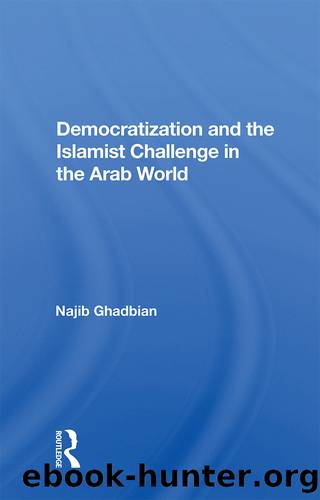Democratization and the Islamist Challenge in the Arab World by Najib Ghadbian

Author:Najib Ghadbian [Ghadbian, Najib]
Language: eng
Format: epub
Tags: Middle Eastern, Social Science, Political Science, World, Regional Studies
ISBN: 9780429720956
Google: iNmiDwAAQBAJ
Goodreads: 2302201
Publisher: Routledge
Published: 1997-05-01T00:00:00+00:00
Part Three
The Politics of Inclusion and Exclusion: Two Case Studies
5
Egypt: Coercion and Containment
Democratization in Egypt has fluctuated over the past two decades with the regime's efforts to contain the Islamist challenge. Since the mid-1970s, Islamists have been the most popular force opposing the ruling order. Islamists have used the modest increases in the margin of freedom granted by the regime and its occasional tolerance toward the moderate element of the Islamic movement to make gains. The regime, on its part, has been determined to exclude Islamists from political participation. Exclusion has been accomplished by a combination of coercion and containment. That is, the state uses its repressive apparatus to try to eradicate radical Islamists while allowing mainstream Islamists to function, but within constraints that preclude their political participation. The policy of excluding Islamists has led those who rule Egypt to retreat from democratization. This is more than just a move by a ruling group to preserve its privilege and keep one more group of contenders away from power. In the policies of the Egyptian government toward Islamists there is an outraged objection to the very idea of an "Islamic solution" that seems to brook no compromise. This points to sharp disagreement over the contours of collective identity.
The socioeconomic context for this conflict is that Egypt has poor resources and a huge population. The tiny ruling strata holds tightly to these limited resources. Meanwhile, the Islamist crowds are beating at the door demanding their share. The international context further exacerbates the divide. Because Egypt is not a marginal Arab state but a key ally for the United States and European powers, these powers lend their weight to make sure the ruling group stays in control. All these factors further polarize the conflict over who is to be included or excluded in the political process in Egypt. These factors shape the politics of democratization in Egypt.
How do democratic development and the rise of Islamists intersect in Egypt? How did Egypt arrive at the stalemate of the 1990s which has produced such violent political confrontation in that country? Is there any solid ground upon which democratization in Egypt could develop?
Download
This site does not store any files on its server. We only index and link to content provided by other sites. Please contact the content providers to delete copyright contents if any and email us, we'll remove relevant links or contents immediately.
| Bahrain | Egypt |
| Iran | Iraq |
| Israel & Palestine | Jordan |
| Kuwait | Lebanon |
| Oman | Qatar |
| Saudi Arabia | Syria |
| Turkey | United Arab Emirates |
| Yemen |
Empire of the Sikhs by Patwant Singh(23073)
The Wind in My Hair by Masih Alinejad(5092)
Rise and Kill First by Ronen Bergman(4779)
The Templars by Dan Jones(4682)
The Rape of Nanking by Iris Chang(4203)
12 Strong by Doug Stanton(3541)
Blood and Sand by Alex Von Tunzelmann(3195)
Babylon's Ark by Lawrence Anthony(2672)
The History of Jihad: From Muhammad to ISIS by Spencer Robert(2620)
No Room for Small Dreams by Shimon Peres(2365)
The Turkish Psychedelic Explosion by Daniel Spicer(2354)
Inside the Middle East by Avi Melamed(2352)
Gideon's Spies: The Secret History of the Mossad by Gordon Thomas(2346)
Arabs by Eugene Rogan(2292)
The First Muslim The Story of Muhammad by Lesley Hazleton(2267)
Come, Tell Me How You Live by Mallowan Agatha Christie(2253)
Bus on Jaffa Road by Mike Kelly(2150)
Kabul 1841-42: Battle Story by Edmund Yorke(2025)
1453 by Roger Crowley(2023)
